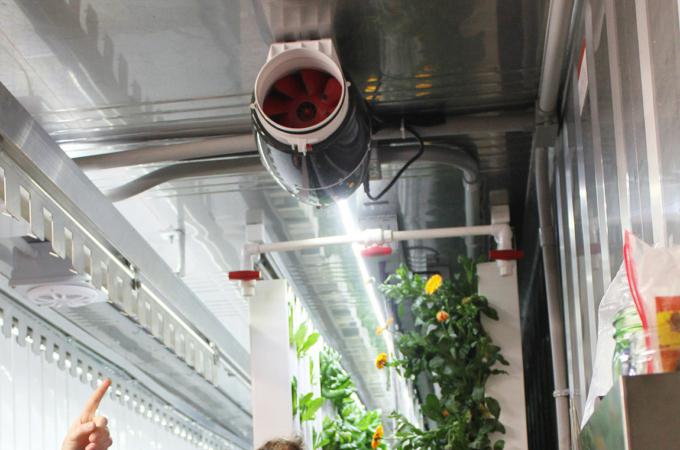Catholic Memorial's urban farm will integrate science, technology and social justice
Tucked beneath the massive old Edison power plant, which has loomed over South Boston for decades, is Freight Farm. The startup company modifies shipping containers to build hydroponic farms, in which plants and vegetables can grow virtually anywhere. Freight Farms was co-founded by Jon Friedman and Brad McNamara, who started their company in 2010.
One of those containers will make its home at Catholic Memorial School in West Roxbury, beginning this fall. In addition to providing an innovative and experiential learning program for CM students, the Freight Farm will serve to fulfill the school's mission to help take care of the basic needs of others; in this case, by providing students with the opportunity to study cutting-edge methods and economical means for growing food that can be supplied to local families and food banks.
"CM's new hydroponics lab provides a tangible way of integrating science/ ecology/ environment with Jesus' call to be in solidarity with our neighbors in Boston and beyond who live on the margins," said Theology Department Chair Michael Corso. "As we grow food in the freight farm, we can grow in our theological understanding of how to better serve those who are economically and socially disenfranchised."
"CM's new hydroponics program is a great example of three members of the Boston-area community -- Catholic Memorial School, Suffolk Cares, and Dellbrook/JKS, joining together to help people in need," said CM President Peter Folan. "While creating opportunities for innovative learning programs, we are also taking essential steps to building a better future for all."
Within the Freight Farm system, irrigation, temperature and lights can be controlled remotely through an app. Student and teacher farmers will be able to check on growing conditions such pH levels and climate changes in the unit using a mobile dashboard. The CM farm will require the use of only 10 gallons of water per day.
"Catholic Memorial, it's faculty and students, is very excited to incorporate this innovative, agricultural ecosystem into our school's forward-thinking, interdisciplinary STEM curriculum. Through the Freight Farm, our students will apply principles of science in a real-world application as they take responsibility for managing an urban farm," said Science Department Chairman Brian Palm.
This new science program will also answer Pope Francis' call for each community to "protect the earth and ensure its fruitfulness for coming generations."
In his encyclical on the environment "Laudato Si," Pope Francis writes: "We have to realize that a true ecological approach always becomes a social approach; it must integrate questions of justice in debates on the environment, so as to hear both the cry of the earth and the cry of the poor."
With the addition of Freight Farm, CM students and faculty will have the unique opportunity to address Pope Francis' plea and to demonstrate to the community that food can be grown in "impossible places," to help feed those in need.
"Questions of social justice are inseparable from our students' study of Scripture, the Church, sacraments, discipleship, and service," Corso added.



















